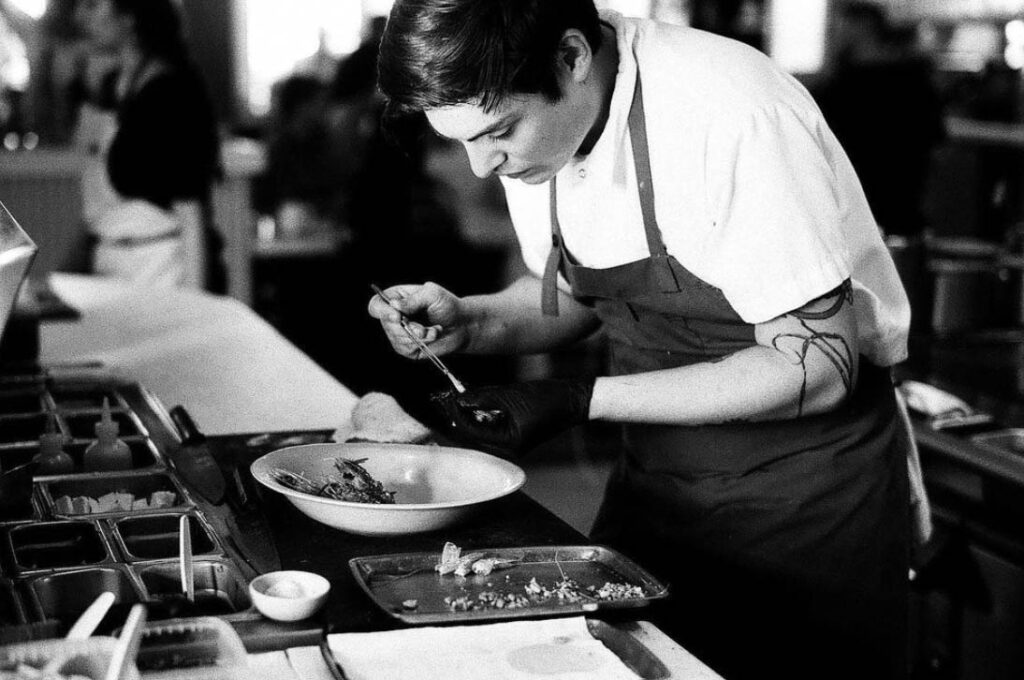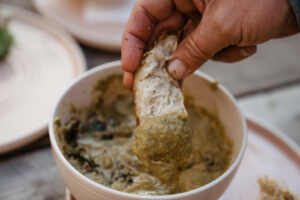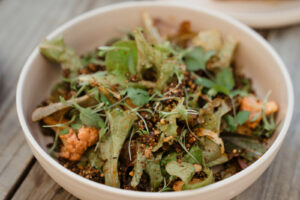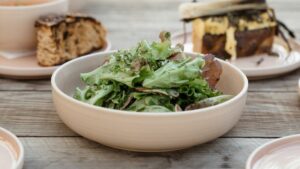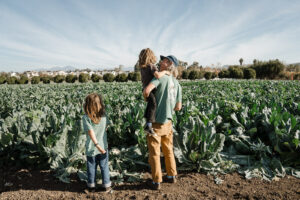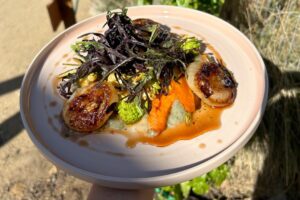A veteran of the culinary industry, Michael Vera became fascinated by fermentation and, at the prompting of an executive chef, began growing his own ferment starters. During the 2020 lockdown, Chef Michael began selling small-batch ferments produced in his home kitchen. Today, he divides his time between his business West Coast Koji and catering private events with his California New American cuisine, drawing on Japanese influence of umami-centric fermentation to highlight ingredients sourced from local growers and foraged from the wild. Read our conversation with the fascinating chef below, and to get tickets to his upcoming dinner on the farm, click here.
The Ecology Center: What first sparked your imagination regarding local seasonal ingredients?
Chef Michael: Growing up in a small town in South Texas, there wasn’t much of an abundance of seasonal ingredients available. Few varieties of fruits and vegetables did well, and most of the land was used for large agricultural operations growing cotton and grain. When I moved to Southern California after graduating culinary school, I realized it was the best decision I could have made because of the local ingredients that I would get to handle and cook every day. The variety and abundance of beautiful produce, along with the relationships with farmers that grew it, really taught me to appreciate what we have and to support the people that make it possible.
The Ecology Center: What drives your passion for regenerative cuisine?
Chef Michael: Now more than ever, the future is very unclear. Food shortages, inflation, and severe weather are just a few results of poor choices like not being environmentally conscious enough and having some of the largest food waste numbers in the world. The best hope we have for a sustainable future is to support farms, as well as companies that create their products through sustainable practices. It is important to cook with the seasons here in California because it offers so much variety. The best tasting food you’ve ever had doesn’t have to come from across the globe and leave a large carbon footprint.
The Ecology Center: How has a regenerative ethos developed your art?
Chef Michael: The community of chefs, fermenters, and farmers I’ve had the pleasure of meeting have taught me some invaluable lessons. Caring about what you’re doing is the key to a successful career. Working hard, being humble, and being dedicated to a practice that can make a difference in the world is important for the next generation to care the same and even more.
The Ecology Center: What do you see as one of the culinary industry’s biggest challenges to caring for the earth?
Chef Michael: One of the biggest challenges has to be the availability of practically any ingredient in the world. Let’s be honest: chefs love fancy, luxurious ingredients. That rare fish from Japan, that Alba white truffle from Italy, the foie gras from France. While these things are amazing, shipping it across the world leads to bigger problems.
Reducing food waste is another huge thing that we as chefs and cooks need to be conscious of. Fermentation is a great medium for reducing that waste—it lets us create new and exciting flavors out of things that are normally seen as scrap or waste. For instance, fish bones can become an umami-rich sauce by fermenting with koji, or the cut-off tops of chili peppers can be fermented with honey to create a delicious drizzle for breads and cheeses. A little imagination can create a luxury experience that you can call your own.
The Ecology Center: How can the culinary industry do a better job of caring for people?
Chef Michael: The industry as a whole is heading in a more positive direction by treating people much better than it did in the past. The understanding of the struggles that this industry can present has led to better mental health, better wages, and better quality of life…though there is still a way to go. The culinary industry needs to invest in our future by pledging to take small steps that can make a larger positive impact. Teaching this way of thinking to the next generation of cooks will make a big difference.
The Ecology Center: If you could change one aspect of our current food system or culture through your work, what would it be?
Chef Michael: One of my goals with West Coast Koji is to educate people about fermentation and koji. I know koji can make a huge impact on food waste in restaurants. Learning how koji has an effect on food and flavor, and how it can be applied to an unlimited amount of different ingredients is not only going to lead to a less wasteful future, but a much more flavorful one too.
The Ecology Center: When you imagine a food culture that cares for the earth, cares for people, and shares abundance with those in need, what does it look like to you?
Chef Michael: The Ecology Center is a community that puts into practice what we sometimes can only dream about. The type of food culture that cares about community, the people, and the bigger picture is something that I personally believe we will see more of in the future. By taking small steps, and educating the next generation, we can create a community where it becomes second nature to try and make a more positive impact.


